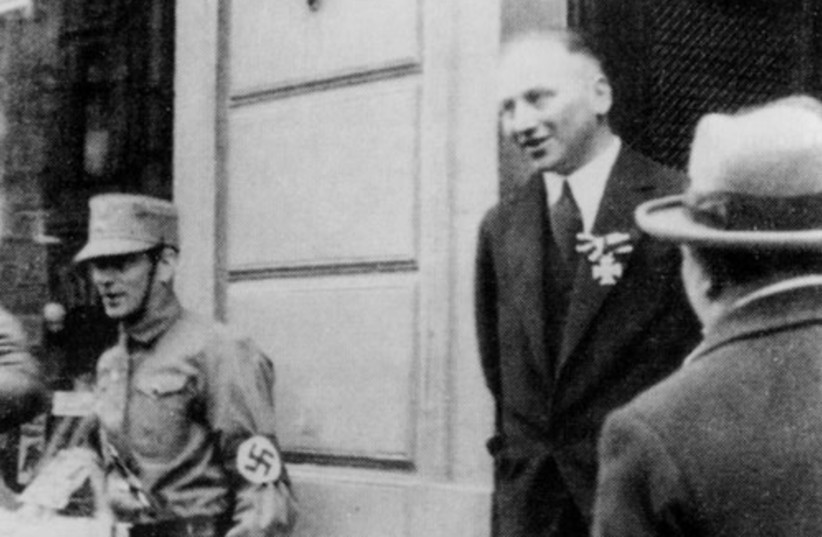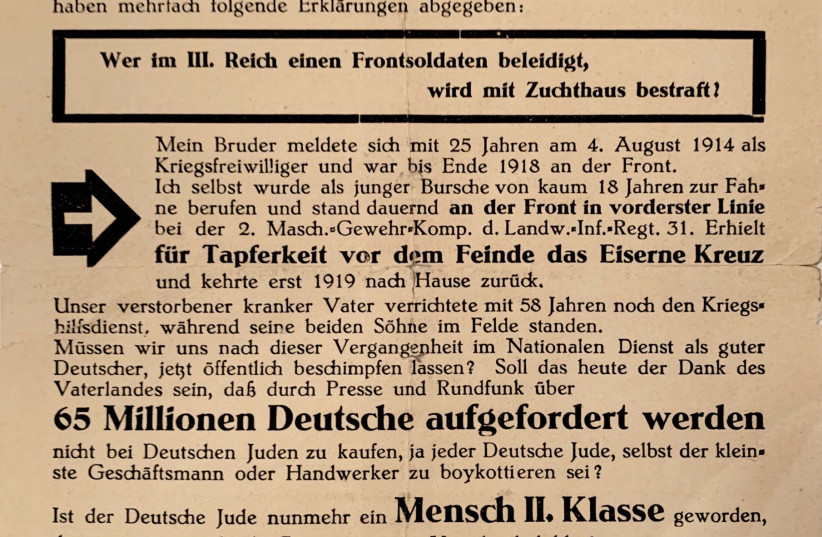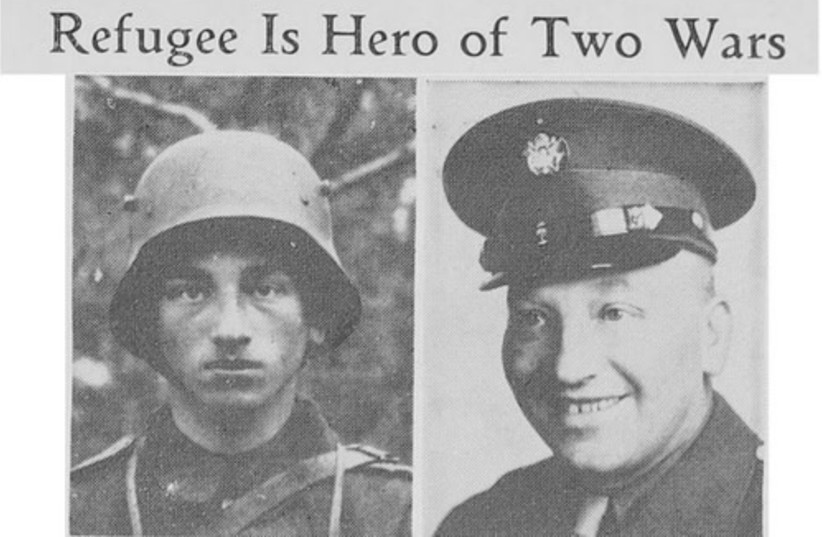What do we view as heroism? We acknowledge those who win medals for amazing actions done in the military, honoring them for performing in an admirable way during battle. We see those people as heroic because they act with bravery despite the life threatening circumstances of war.
Often, however, we do not look the same way at protestors. Perhaps we disagree with the issues they stand for. Perhaps, if there are many other protestors or if we ourselves are even protesting along with them, it becomes hard to see the act as heroic or exceptional.
Yet, a protest can most certainly also be an heroic act.
This photo is of Richard Stern standing in the doorway of his store in Cologne, German on April 1, 1933:

A Nazi SA soldier is standing next to him. Stern was protesting the boycott of Jewish businesses initiated by the German government of Hitler and the Nazi party, who had taken power just two months earlier. This was Hitler’s first official action against the German Jews.
Stern turned out to be the only Jewish protestor against the Nazis in Cologne on April 1, 1933. Today, the photo is featured in at least five different museums in Germany.
On January 31, 1933 the Stern family along with all the Jews in Cologne, had seen a shocking number of Nazi flags hanging from stores and houses all over the city. It was a celebration of Hitler and the Nazi party’s rise to power.
On February 17, Hitler ordered all local police headquarters to create working relationships with the Nazi party’s paramilitary SA and SS units, helping to set the stage for the Nazis’ official suppression of German Jews. A detailed plan was put together for the boycott of all Jewish businesses to take place on April 1, 1933. SA soldiers were ordered to stand in front of Jewish stores to warn German citizens not to enter them.
In addition, the Nazis began to take control of all of the news organizations. They wanted newspapers to support the actions against the Jews, so their planning instructions stated, “if newspapers do not do this or do too little, they must immediately be removed from every house where Germans live.”
Most of the Jewish community knew the boycott was coming.
Richard Stern told his family and friends, “I cannot be silent.”
He was a strong supporter of the Weimar Republic’s civil rights and was an active member of the Social Democratic Party. Stern believed that other Jews would join him in protesting. However, the bulk of Jewish leaders in Cologne believed that finding a way to cooperate with the Nazi government would ultimately protect German Jewry. They were afraid to take an open stand against the oppression of Jewish people, so Richard Stern found that he was the city’s sole protestor.
Stern felt that protesting as a war veteran would be the most effective action, and so he donned the Iron Cross he was awarded in World War I.
He had been drafted in June of 1917, a point in the war when most Germans knew they would lose. Nonetheless, Stern acted bravely enough to be awarded the Iron Cross in August of 1918, very close to the end of the conflict.
Following announcement of the 1933 boycott, Stern wrote a pamphlet condemning the Nazis for their actions against the Jewish people despite the dedication of Jewish soldiers like him during World War I. The pamphlet declared that “We see this action against German Judaism as an insult to the memory of 12,000 German combat soldiers of the Jewish faith killed in action,” and he signed it “Combat Veteran Richard Stern.”

Stern handed the pamphlets out to everyone passing by his store. Look at Stern’s face in the photo. He is smiling, displaying his feeling of being a true soldier, while the SA “soldier” standing next to him was an impostor. When the Nazis took power, typical SA soldiers were young, never having truly served in the German army, and certainly not in any fields of combat comparable to those in which Stern and others like him had fought.
Richard Stern even gave the pamphlet to the SA soldier standing next to him. This was particularly brave as there was a Nazi newspaper station right next to his store. An hour later he was arrested and taken to police headquarters. While he was sitting there, he felt nervous. A police officer who, like many others had joined the Nazi party because of Hitler’s orders, approached Stern because he knew him.
He asked, “What are you doing here?”
“They arrested me,” Richard Stern answered.
“You better get out of here.”
The policeman saw Richard Stern as a friend because he was also a German war veteran and sneaked him out the back door.
As the Nazi actions against German Jews got worse through the 1930s, there were times when Richard Stern felt fear for himself, his sister and her son. He became determined to get the three of them out of Germany and to safety in the United States. Yet before he managed to get out, he continued to help his fellow Jews. When Germany took over Austria in March of 1938, a chunk of Austrian Jews began to flee to try and escape the Nazis. A number came to Cologne and Stern harbored them and tried to help them escape to Belgium.
After Kristallnacht, in the fall of 1938, he connected to family in New York and finally succeeded in immigrating there in May of 1939.
Once the United States entered the war following the attack on Pearl Harbor in December 1941, Richard Stern, then 43 years old, volunteered for the American army so that he could fight against the Nazis. He was accepted in October of 1942 and began training with the engineering battalion to which he was assigned. Stern refused an honorable discharge due to his advanced age, and by the end of October 1943, his battalion was involved in difficult battles in Italy. Before he deployed he donated his German war medals (including one he received from Hitler himself, who had not realized that Stern was Jewish) to the national scrap drive in support of the war effort. Then, in early January of 1944, he became a hero in the American army for saving his company, which had been surrounded by German machine gunners at the top of Italy’s Mount Porchia.
He reportedly persuaded the Germans to surrender “if they wished some day to return to the Fatherland.” Stern was promoted and awarded a Silver Star. His valor was reported in newspapers around the world and he was even played by a famous actor on the radio.

What do we view as Richard Stern’s heroism?
His actions in World War I and World War II, each for a different side, fit how people usually judge a hero, yet was his protest against the Nazis and standing up for civil rights any less exceptional?
Richard Stern did not succeed in causing any significant change in Germany through his moral and principled stand. He certainly had moments of fear and doubt, yet the feelings of failure he felt following the protest caused him to be even more determined to find a way to continue opposing the Nazis and Hitler.
Heroism is not just a particular action. It is also devotion to proper morality. Richard Stern teaches us that.
—
W. Jack Romberg is the author of the book A Doorway to Heroism: A Decorated German-Jewish Soldier Who Became an American Hero, which tells the story of his great-uncle, Richard Stern.
This article originally appeared on The Librarians, the official online publication of the National Library of Israel dedicated to Jewish, Israeli, and Middle Eastern history, heritage and culture.
